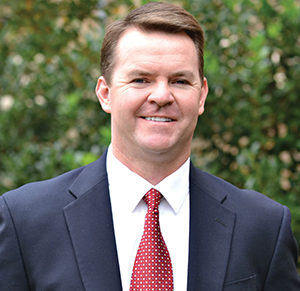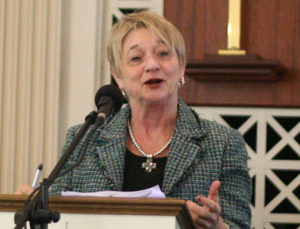The Baptist General Convention of Texas will end pass-through funding for the Cooperative Baptist Fellowship because of a new CBF practice allowing the hiring of LGBTQ Christians to some, but not all, ministry positions.
The BGCT Executive Board voted Feb. 20 to revise contribution forms used by 5,600 Texas churches by removing the 1,800-church Fellowship as an option for giving through its Cooperative Program unified budget.
The nearly unanimous vote, with just one dissent, responds to a change adopted by Fellowship leaders Feb. 9 in implementing a hiring policy for CBF staff which dropped a two-decade-old wording forbidding the employment of “a practicing homosexual.” Last year the BGCT withdrew fellowship from three CBF partner churches for adopting membership policies more welcoming and affirming of gays.

Danny Reeves
“I am very grateful for the consistent, steady way in which the BGCT has held to God’s Word,” BGCT President Danny Reeves, senior pastor of First Baptist Church in Corsicana, Texas, said in a news release.
“We lovingly say to all people the truth that marriage is to be between one man and one woman,” said Reeves, a two-time graduate of CBF partner George W. Truett Theological Seminary at Baylor University.
Established in 1925, the Cooperative Program is a unified funding plan originally intended to allow autonomous churches nationwide to support work of both the Southern Baptist Convention and their particular state convention by writing a single check.
The BGCT has since 1994 allowed churches to designate mission gifts to selected non-SBC entities, including the CBF, and still count those funds as part of the Cooperative Program.
The move, intended to accommodate congregations resisting a rightward ideological shift in the Southern Baptist Convention, created sufficient backlash to prompt the 1998 formation of the Southern Baptists of Texas Convention affirming fidelity to the “conservative resurgence” at the national level.
Last year the BGCT forwarded $800,000 to the Cooperative Baptist Fellowship through its unified budget and another $300,000 to the CBF Global Missions Offering, Treasurer and CFO Jill Larsen told the Executive Board.
In the future churches that have been using the BGCT giving option will have to send their money directly to the CBF. New giving forms sent to Texas churches will include a letter explaining the action taken by the Executive Board.

CBF Executive Coordinator Suzii Paynter presents a portion of the Illuminations Project report Feb. 9 in Atlanta. (Photo by Bob Allen)
CBF Executive Coordinator Suzii Paynter, former director of the Texas Baptist Christian Life Commission and the Advocacy Care Center of the Baptist General Convention of Texas, called the move “deeply disappointing.”
While it “changes the cooperative method by which Texas Baptist churches support CBF,” Paynter said, “it will not change our prayerful expectation that churches will support CBF directly as a mission-sending organization to more than 30 countries around the world.”
The CBF changed its hiring policy after a nearly two-year “Illumination Project” assessed various viewpoints about human sexuality present in the Fellowship. Citing common practices in CBF churches and relationships with overseas mission partners, Fellowship leaders adopted a “third way” compromise dropping the outright ban on LGBTQ hiring while maintaining sexual orientation as a criterion for some positions.
The new CBF hiring policy expects all employees “to have the highest moral character” and display “professionalism and a commitment to the highest ethical standards,” but no longer addresses sexual orientation.
A separate implementation plan adds, for full disclosure, that the CBF will still “consider matters of human sexuality as one factor among many in employment for some positions, including field personnel, those who supervise field personnel and ministry/mission leadership at CBF Global in Decatur.”
The move energized conservative critics like Southern Baptist Theological Seminary President Albert Mohler, who described the move toward LGBTQ inclusion as “inevitable once the full authority and truthfulness of the Bible are abandoned.”
At the same time, it disappointed CBF supporters who view sexual equality not in terms of private morality but as a matter of social justice.
“Suffice it to say that we stand with our LGBTQ+ siblings in faith and we will strive fully to affirm God’s calling and gifting in everyone as these are manifested,” responded a posting on Facebook by Williamsburg Baptist Church in Williamsburg, Va.
The congregation, also affiliated with the Alliance of Baptists, recently updated its constitution and bylaws with a statement extending membership to LGBTQ+ individuals.
“While our church has never adopted an exclusionary statement against LGBTQ+ people, I proposed that we make an explicit statement as a witness to our commitment to extend God’s welcome in a culture that still — in many ways — is unsafe for LGBTQ+ people,” Pastor Daniel Reay Wilson said in a letter announcing the policy which was published on the church website.
“We ask LGBTQ+ people and their allies to forgive us for our slowness,” he continued. “For those who do not understand our decision, or even find us contemptable, please know that this decision came because of our Christian convictions, not in spite of them.”
Under the implementation plan, about 20 percent of CBF jobs are said to be open only to candidates who “practice a traditional Christian sexual ethic of celibacy in singleness or faithfulness in marriage between a woman and a man.”
“Much has been said from across the spectrum related to the implementation of CBF’s new Christ-centered hiring policy, but one thing is for sure — what unites us is nothing other than our mission to advance the cause of Christ,” Paynter commented Feb. 20 on the CBF blog.
“I hope rather than making immediate decisions related to funding to the detriment of CBF missionaries serving all over the world, Texas Baptist pastors and lay leaders would give to CBF directly and would enter into conversation with us,” she said.
Previous story:
Texas Baptist convention takes note of more inclusive hiring policy by CBF
